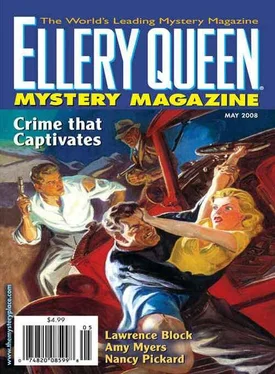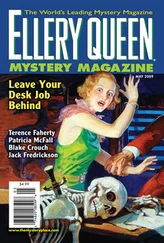Lisa Atkinson - Ellery Queen’s Mystery Magazine. Vol. 131, No. 5. Whole No. 801, May 2008
Здесь есть возможность читать онлайн «Lisa Atkinson - Ellery Queen’s Mystery Magazine. Vol. 131, No. 5. Whole No. 801, May 2008» весь текст электронной книги совершенно бесплатно (целиком полную версию без сокращений). В некоторых случаях можно слушать аудио, скачать через торрент в формате fb2 и присутствует краткое содержание. Город: New York, Год выпуска: 2008, ISBN: 2008, Издательство: Dell Magazines, Жанр: Детектив, на английском языке. Описание произведения, (предисловие) а так же отзывы посетителей доступны на портале библиотеки ЛибКат.
- Название:Ellery Queen’s Mystery Magazine. Vol. 131, No. 5. Whole No. 801, May 2008
- Автор:
- Издательство:Dell Magazines
- Жанр:
- Год:2008
- Город:New York
- ISBN:ISSN 0013-6328
- Рейтинг книги:5 / 5. Голосов: 1
-
Избранное:Добавить в избранное
- Отзывы:
-
Ваша оценка:
- 100
- 1
- 2
- 3
- 4
- 5
Ellery Queen’s Mystery Magazine. Vol. 131, No. 5. Whole No. 801, May 2008: краткое содержание, описание и аннотация
Предлагаем к чтению аннотацию, описание, краткое содержание или предисловие (зависит от того, что написал сам автор книги «Ellery Queen’s Mystery Magazine. Vol. 131, No. 5. Whole No. 801, May 2008»). Если вы не нашли необходимую информацию о книге — напишите в комментариях, мы постараемся отыскать её.
Ellery Queen’s Mystery Magazine. Vol. 131, No. 5. Whole No. 801, May 2008 — читать онлайн бесплатно полную книгу (весь текст) целиком
Ниже представлен текст книги, разбитый по страницам. Система сохранения места последней прочитанной страницы, позволяет с удобством читать онлайн бесплатно книгу «Ellery Queen’s Mystery Magazine. Vol. 131, No. 5. Whole No. 801, May 2008», без необходимости каждый раз заново искать на чём Вы остановились. Поставьте закладку, и сможете в любой момент перейти на страницу, на которой закончили чтение.
Интервал:
Закладка:
Could the Reverend Watkins really be the sweet elderly parson he appeared? On the journey back to London, the distressed gentleman sitting mentally at Auguste’s side seemed to have no doubt. He was vigorously shaking his head.
As the train puffed into Canterbury station with a triumphant belch of steam, Auguste was looking forward to his last visit. So far he had apparently achieved little, but it was remarkable what could come of the most unlikely ingredients, and he was hopeful of his last appointment. The distressed gentleman seemed to be determined to accompany him on this journey, too, and indeed, in these circumstances, Auguste could hardly not bear him in mind. His most splendid rhetoric had frequently issued forth over the ghastly contents of the locked room and the skeleton found therein. His performance of this story had seemed to lean heavily on the well-known play of Maria Marten and the Red Barn for its emotions. The disappearance of poor Maria at the pitiless hands of her lover lent itself admirably to his story of the missing bride.
“Oh Heaven, deliver the murderer into the hands of justice,” the distressed gentleman had so often roared with tears in his eyes for the benefit of his audience. “Show no mercy for the bloody deed. Thy father will revenge thee, child.” His trembling voice was lowered for these last words.
Sir William Taylor, brother of the original owner of the mysterious locked room, lived in an elegant Georgian house on the outskirts of the city, and Auguste amused himself in its morning room studying the splendid oil paintings as he waited some considerable time for his host. He was admiring one of a seated young lady in a white dress with elegant draperies, when Sir William eventually arrived. He seemed in his late seventies, much older than the lady in the portrait, and not the most benevolent-looking philanthropist Auguste had ever seen.
“Your daughter, sir?”
“My second wife, Alice,” Sir William grunted. “My first wife died abroad in the ‘sixties. That’s her there.” He pointed to an inferior oil painting tucked away behind the door. A meek-looking lady looked somehow lost surrounded by her enormous blue crinoline, with one hand displaying an ornate wedding ring resting on the family Bible. “Now, what are you here for?” he barked. “That house in the Strand, I suppose.”
“On behalf of a murdered man—”
A sharp look. “My dear sir,” he interrupted, “if you are another of those ghost hunters, pray speak to the new owners. I saw no ghost while I lived there, I heard no ghost, and furthermore I have no interest whatsoever in any ghost anywhere. Clear?”
“A Mr. Montague Phelps was murdered on Tuesday night.”
“Never heard of him.”
“A distressed gentleman.”
Sir William looked surprised and then began to laugh. “You don’t mean that scallywag who used to beg outside my door in the Strand until I saw him on his way? Tall fellow in his forties, looked like Mr. Micawber without the grin.”
“It could well be.”
“Why come to me? It’s ten years since I sold that house.”
“You heard about the corpse discovered in the room after the sale?”
He looked taken aback. “Of course. Joseph’s doing. Poor fellow. Out of his mind. Brooded on his wrongs, pursued the poor woman, killed her, and put her in there. Always weird, was Joseph.”
“You were never tempted to open the door when you lived there, sir?”
A furious reply to this. “I was legally bound not to, and I didn’t. And about this fellow Phelps: If you’re implying what I think, Mr. Didier, I give to the poor. I don’t go round murdering distressed gentlemen — or distressed wives.”
Auguste decided to leave the house, with Sir William in full agreement. Whatever he might say, Auguste concluded, he was a fit man, despite his age, and one whose jaw suggested that no one and nothing would stand in his way. Especially not distressed gentlemen.
“The portrait showed a fine wedding ring.” Auguste produced a sketch he had made of it from memory on the journey home and handed it to Egbert Rose after he had completed the rest of his investigations. “Perhaps the same ring might have been found on the corpse?”
The inspector had not been pleased to hear of Auguste’s endeavours and was only partly mollified by interest in what he had discovered. “I’ll look into it,” he grunted. “What about your hunt for the Italian?”
Auguste produced his ace. The distressed gentleman would have swept off his hat and bowed in deep appreciation at such a coup — holding out the hat, of course, for tangible recognition. Auguste was particularly proud of this coup, especially as it had involved no visits to Italian communities where he might be forced to partake of their cuisine. “There is an Italian man of middle years working in Romanos. He speaks excellent English and could well by his manner have been an actor.”
“Does he answer to the name of Fantino?”
Uncertain whether this was a joke, Auguste decided to take it seriously. “No,” he admitted. “But then, he wouldn’t.”
Egbert Rose laughed, put in a good humour again. “What about our clergyman? Any signed confessions to Gabrielle Flower’s death?”
“No, but he was living at the time of the murder in the village of Lower Potwell. I have checked it, and it is not only in Warwickshire but next to the village where Miss Gabrielle Flower was brought up. He could easily have been the childhood sweetheart.”
He waited for the inspector to congratulate him, but was disappointed.
“Are you cooking up red herrings for me, Auguste?”
“Mock turtle soup,” Auguste replied automatically, flustered by the sharp note in the inspector’s voice, and then realising his mistake. “My apologies, Inspector. That is on the luncheon menu.”
Egbert Rose was unrelenting. “No real turtles around?”
He looked round as though expecting to see several turtles on their backs awaiting execution, Auguste thought crossly. Fifty years ago, in the days when Francatelli cooked for the queen, that might have been the case. This, however, was a different age, when his cookery instruction to “procure a fine lively turtle weighing about 120 lbs” had produced no problem at all for the enthusiastic cook. Nowadays, with the pace of the London life, kitchens were hard put to it to find the time to produce even mock turtle soup. Hardly progress. Even as this thought passed through Auguste’s mind, something stirred, however. He could almost see the distressed gentleman sitting at a table as he had done that evening waiting eagerly for his dinner.
“Mock turtle soup!” he exclaimed.
“So you said. Too early in the morning, thank you.”
“No, no. Perhaps the distressed gentleman was providing mock turtle soup with these three crimes.”
“Not sure I follow you,” Egbert Rose said cautiously
“I don’t yet follow myself,” Auguste admitted excitedly, “but I am tracking the turtle.”
“Well done. Perhaps you’d take me with you, if you’d be so kind.”
Auguste tried to do so. “Sir William Taylor is a real turtle, is he not?”
“Mr. Didier...” the inspector began threateningly.
“Please bear with me,” Auguste pleaded. “This soup takes time to prepare. Whether or not he murdered his first wife, as I believe he did, he remains real. Phelps also could have seen and recognised him recently.”
“True,” Egbert Rose admitted.
Encouraged, Auguste continued. “Our clergyman, too, is a real turtle. Whether or not he was also a murderer, he was present at the crime. Phelps could also have seen and recognised him recently.”
“Obviously.”
Auguste hurried on. “That leaves one candidate for mock turtle. Giovanni Fantino.”
Читать дальшеИнтервал:
Закладка:
Похожие книги на «Ellery Queen’s Mystery Magazine. Vol. 131, No. 5. Whole No. 801, May 2008»
Представляем Вашему вниманию похожие книги на «Ellery Queen’s Mystery Magazine. Vol. 131, No. 5. Whole No. 801, May 2008» списком для выбора. Мы отобрали схожую по названию и смыслу литературу в надежде предоставить читателям больше вариантов отыскать новые, интересные, ещё непрочитанные произведения.
Обсуждение, отзывы о книге «Ellery Queen’s Mystery Magazine. Vol. 131, No. 5. Whole No. 801, May 2008» и просто собственные мнения читателей. Оставьте ваши комментарии, напишите, что Вы думаете о произведении, его смысле или главных героях. Укажите что конкретно понравилось, а что нет, и почему Вы так считаете.












